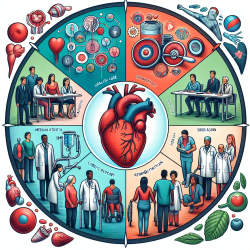Introduction
Spontaneous Coronary Artery Dissection (SCAD) is a rare yet significant cause of acute coronary syndrome, predominantly affecting women. Despite its impact, clinical practice guidelines for SCAD management remain underdeveloped. The recent study, "Spontaneous Coronary Artery Dissection Across the Health Care Pathway: A National, Multicenter, Patient-Informed Investigation," provides critical insights into the patient journey and highlights areas for improvement in practitioner skills and patient care.
Understanding SCAD: Key Findings
The study involved 89 patients diagnosed with SCAD, with a majority being women (86.5%) and an average age of 53.2 years. The research revealed several key findings:
- Emotional Distress: Emotional distress, particularly anxiety, was identified as a common precipitating factor in 56% of cases.
- Awareness and Detection: Only 35% of patients and 55% of healthcare providers were aware of SCAD as a cardiac event, indicating a need for increased awareness and education.
- Communication and Prognosis: A significant 79% of patients perceived the communication regarding prognosis and self-management as poor.
- Psychological Impact: Post-event psychological disorders were evident in 30% of patients, with 73% fearing recurrence.
- Follow-up Care: There was a strong desire (72%) for tailored short- and long-term follow-up care.
- Cardiac Rehabilitation: Despite recommendations for secondary prevention programming, completion rates were low (48%), and current programs were deemed inadequate.
Implications for Practitioners
These findings underscore the importance of a patient-centered approach in managing SCAD. Practitioners can enhance their skills and improve patient outcomes by implementing the following strategies:
- Enhance Awareness: Increase education and training for healthcare providers to improve the detection and management of SCAD.
- Improve Communication: Develop clear communication strategies to better inform patients about their condition, prognosis, and self-management options.
- Address Psychological Needs: Integrate psychological support into the treatment plan to address anxiety and fear of recurrence.
- Tailor Follow-up Care: Design personalized follow-up care plans that cater to the specific needs and preferences of SCAD patients.
- Optimize Cardiac Rehabilitation: Reevaluate and adapt cardiac rehabilitation programs to ensure they are accessible and effective for SCAD patients.
Encouraging Further Research
This study highlights the need for further research to validate the hypotheses generated and to develop standardized clinical guidelines for SCAD management. Practitioners are encouraged to engage in or support research efforts that focus on patient-informed data to enhance the understanding and treatment of SCAD.
To read the original research paper, please follow this link: Spontaneous Coronary Artery Dissection Across the Health Care Pathway: A National, Multicenter, Patient-Informed Investigation.










